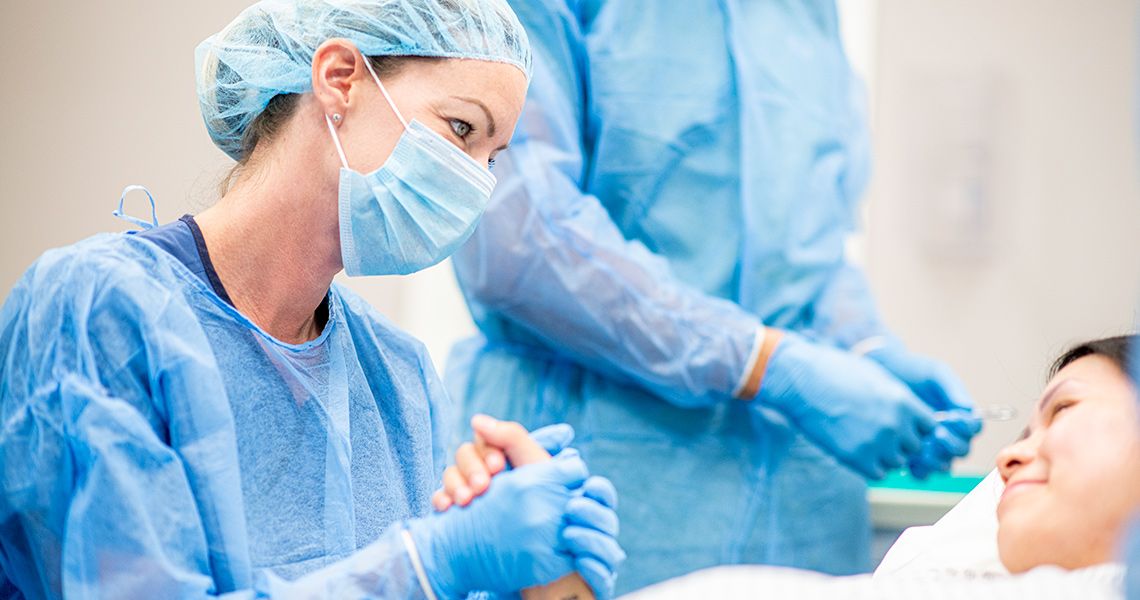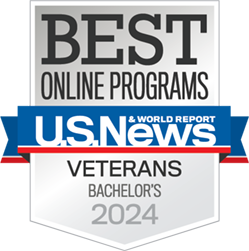
Post-baccalaureate Certificate in Clinical Embryology and Assisted Reproductive Technology
Hybrid
12 Months
The Certificate in Clinical Embryology and Assisted Reproductive Technology at the George Washington University (GW) School of Medicine and Health Sciences (SMHS) prepares individuals to work in facilities as trained laboratory professionals who specialize in helping infertility case treatment via the use of in vitro-fertilization (IVF) and assisted reproductive technology (CEART).
This program includes a combination of online coursework and hands-on labs in human embryology, and andrology. The required in-person lab courses at the GW Virginia Science and Technology Campus, VSTC, are completed in the final semester.
The CEART program explores the latest in clinical embryology. Over the duration of the program, students will explore the interconnected sciences of endocrinology, embryology, cryobiology, and andrology.
To learn more about our programs, you can register for our upcoming events.
*The total number of credits and duration of the program depend on the number of transferred credits
Program Highlights
- GW has one of the only CEART program at the undergraduate level with hands-on laboratory skills in the country.
- Learn from experienced laboratory scientists who are experts in their field.
- Complete a professional program at an accredited, prestigious university that can give you not only a degree, but a career.
- Become eligible to take several board certification examinations in the areas of embryology and andrology.
- Excellent foundation for those wishing to progress to advanced degrees or health professions, such as medicine.
- Rolling admissions Fall, Spring, and Summer.
Request Information
* Indicates required field
- Read: Privacy Disclaimer Acknowledgment
-
By submitting your contact information, you are providing your express consent authorizing GW and GW's representatives to contact you by email, phone, or text (including the use of an automatic dialing system). Standard text messaging and/or data rates may apply.
If you do not provide your contact information (phone and email), we may not be able to provide you with the information you requested.
If you provided your contact information but no longer wish to receive phone calls, emails, or text (SMS) messages from GW, you will have the option to opt-out. Emails and Text messages will include details for unsubscribing/opting out. To opt out of receiving phone calls from GW, contact us via email at info [at] hsprograms [dot] gwu [dot] edu (info[at]hsprograms[dot]gwu[dot]edu) or text/ call: 202-792-2819.
By submitting your information via this form, you also confirm that you have read and understood the GW Statement of Privacy Practices.
Note that the consent requested above is not required for enrollment in GW's programs. If you do not consent to providing the information requested on this form, you may contact us via email at info [at] hsprograms [dot] gwu [dot] edu (info[at]hsprograms[dot]gwu[dot]edu) or text/ call: 202-792-2819.
Accreditation and Rankings
- GW is accredited by the Middle States Commission on Higher Education
- #62 Best National University*
- #13 Best Online Bachelor's Programs*
- #7 Best Online Programs for Veterans*
* The U.S. News & World Report – 2024 Rankings



Curriculum
The CEART program requires 20 credits, minimally, of GW coursework.
Coursework provides a blend of online lecture and on-campus laboratory courses. The lab courses held at our Ashburn, VA campus are completed in the final semester.
Program Outcomes
Upon successful completion of the program, learners will be able to:
- Evaluate current trends in embryology and andrology as they relate to human reproduction.
- Evaluate solutions and corrective actions for effective problem resolution with regard to embryology and assisted reproductive technology protocols.
- Assess the use and impact of advanced molecular and genetic technologies on clinical outcomes regarding fertility.
- Apply best practices in laboratory management and operations within an IVF lab.
Who Is the Ideal Student for This Program?
Individuals that have at least a Bachelor’s degree in a science, pre-medicine, applied science, or equivalent, who want to move into a highly-rewarding career would be ideal for this program. In a field typically offered only at the master’s level, you’ll need to be independent, organized, and able to manage your time effectively.
Career Outlook
When you graduate from this program, you’re prepared to work as a laboratory scientist in:
- Assisted reproduction technology laboratories and fertility clinic laboratories.
- Biotechnology companies.
- Research institutes.
Assisted Reproductive Technology/In-vitro Fertilization Technologists earn between $50,000 and $95,000 a year, based on experience, position, location, and certifications.
Nationally there is a critical shortage of experienced clinical embryologists due to the lack of educational training programs in the United States as well as an increased need for IVF and CEART across the country. As a result, the job demand in this field is high.
Admission Requirements
To be accepted into this program, you must meet all program requirements.
Tuition Details
The Post-baccalaureate Certificate in Clinical Embryology and Assisted Reproductive Technology program at GW consists of 20 credit hours. Please find the cost per credit hour and total estimated program costs here.
Note: Tuition rates are subject to change and additional fees may vary by program.
Meet the Program Director

GW’s experienced faculty provide you with the rich, practical knowledge and support needed for you to succeed in the program and in your career.
Marcia A. Firmani, PhD, MSPH, MT(ASCP)MBCM
- Read Full Bio
-
Chair of the Department of Biomedical Laboratory Sciences, Director of the MSHS in Clinical Microbiology program, Assistant Professor of Biomedical Laboratory Sciences, Assistant Professor of Microbiology, Immunology, and Tropical Medicine.
Dr. Marcia Firmani has more than 20 years of experience in teaching and research. In addition to her administrative duties, Dr. Firmani both directs and teaches several courses within the BLS department, including Clinical Bacteriology, Molecular Diagnostic Sciences, Molecular Epidemiology, and Plagues, Pandemics & Epidemics. She also mentors undergraduate and graduate research projects and has published peer-reviewed articles with students.
Prior to her arrival at The George Washington University, Dr. Firmani was a principal investigator at the National Biodefense Analysis and Countermeasures Center (NBACC), where she conducted and managed several research projects involving biothreat agent characterization. Dr. Firmani also held two previous faculty appointments.
From 2002–2007 she was an assistant professor in the CLS department at Louisiana State University Health Sciences Center (LSUHSC) in New Orleans. She taught lecture and laboratory courses and directed a research lab where she performed basic and applied research on Mycobacterium tuberculosis and MRSA and mentored master’s student thesis projects.
From 2007–2010, Dr. Firmani was an assistant professor at the University of Wisconsin, Milwaukee (UWM) where she taught various undergraduate CLS courses and graduate-level Biomedical Sciences courses. She also directed a research laboratory where she conducted NIH-funded research on Mycobacterium tuberculosis and mentored both undergraduate and graduate student research projects.
Dr. Firmani has taught numerous continuing education courses in the laboratory science field, including a DVD for the American Society for Clinical Laboratory Science (ASCLS) on emerging infections. She has authored several chapters focusing on infectious diseases in textbooks and has also published her research in peer-reviewed journals, such as Infection and Immunity, and the Journal of Clinical Microbiology.
The CEART (hybrid) program requires 20 credits of online lecture and on-campus laboratory courses. The lab courses are held at our Virginia Science and Technology Campus (VSTC) in Ashburn, VA and may be completed in one semester.
Online Didactic Courses
CERT 3004 Endocrinology for Health Sciences (3)
CERT 4010 Clinical Human Embryology (3)
CERT 4012 Clinical Human Andrology (3)
CERT 4014 Human Reproductive Cryobiology (3)
MLS 4151 Molecular Diagnostics (3)
MLS 4158 Laboratory Management and Operations (3)
In person Laboratory Courses
CERT 4011 Clinical Human Embryology Lab (1)
CERT 4013 Clinical Human Andrology Lab (1)
| Program of Study (20 credits): | |
|---|---|
| Semester 1 |
CERT 3004 Endocrinology MLS 4151 Molecular Diagnostics |
| Semester 2 |
MLS 4158 Laboratory Management and Operations CERT 4014 Cryobiology |
| Semester 3 |
CERT 4010 Clinical Human Embryology and CERT 4011 Human Embryology Lab CERT 4012 Clinical Human Andrology and CERT 4013 Human Andrology Lab |
Key Dates
|
Summer 2026 |
Fall 2026 |
Spring 2026 |
|
| Application Deadline |
March 20, 2026 (Open) |
July 20, 2026 (Open) |
November 19, 2025 (Closed) |
Admission Requirements
To apply for the Certificate in Clinical Embryology and Assisted Reproductive Technology program (hybrid), you'll need:
- Completion of a bachelor’s degree from a regionally accredited college or university prior
to matriculation into the program with the following pre-requisite courses at a grade of C
or better- English Composition (3 credits)
- College Algebra, Statistics, or higher (3 credits)
- Biology (lecture and ‘hands-on’ lab) (8 credits)
- Microbiology (General or Clinical/Medicine - lecture and ‘hands-on’ lab) (4
credits) - Chemistry, Organic Chemistry, Biochemistry, or Clinical Chemistry (3 credits)
- Minimum cumulative and science GPA of 2.5
- Resume
- Official Transcripts
- Letter of recommendation
- Letters of recommendation should be from: Academic instructors who can strongly attest to your academic ability, and/or
Individuals who served in a supervisory capacity for you, and who can strongly attest to your work ethic. - The recommender cannot be from a family or friend.
- Recommender will submit a letter on letterhead with a signature and credentials/contact information via the application portal.
- Letters of recommendation should be from: Academic instructors who can strongly attest to your academic ability, and/or
- Personal statement: Applicants must include a 250–500 word essay describing your reasons for undertaking study at GW, your academic objectives, career goals, and related qualifications including collegiate, professional, and community activities relevant to your program of interest. Include any substantial accomplishments not already mentioned on the application form.
International Students
Effective Fall 2025
International students should check with individual programs regarding eligibility for visa sponsorship. Generally, online and hybrid programs are not eligible for student visa sponsorship from GW. This would include transfer students from any other institution with an existing visa. To be considered for admission, there are required scores that you will need to meet. Score requirements may differ by school and program so check the admissions requirements for your program.
Applicants who have not completed a post-secondary degree from an institution where English is the sole language of instruction are required to submit TOEFL, IELTS, PTE Academic, or the Duolingo English Test scores to be considered for admission. The following are the minimum scores for admission consideration:
- TOEFL: 600 on paper based, 250 on computer-based, or 100 Internet-based,
- PTE: overall score of 68,
- IELTS: an overall band score of 7.0, with no individual band score below 6.0
- DET overall score of 120.
Undergraduate applicants who meet one of the following conditions may be considered for admission without submitting TOEFL, PTE or IELTS or DET scores:
- You have earned an associate’s degree or higher from an institution where English is the sole language of instruction
- You are a citizen of an English-speaking country
Scores may not be more than two years old. To ensure TOEFL scores are sent to GW, use institutional code 5246. An institutional code is not required to send IELTS or PTE scores to GW. DET scores must be submitted via the Duolingo English Test system directly to GW.
Based on the results of your English Proficiency exam results and your application, you may be required to take English for Academic Purposes (EAP) during your first year of study at GW. Please note that GW evaluates each application holistically so applicants may still be recommended for EAP even if they meet the requirements for exemption. Students placed in EAP courses should anticipate additional tuition expenses as well as possible extension of time needed to complete their degree programs.
Official transcripts from institutions outside the U.S. must be accompanied by an official transcript evaluation from an accredited independent evaluating agency. Please be sure you request a detailed evaluation that includes all course titles, credit hours, grades, U.S. degree equivalency, grade-point averages (GPA), and date of degree conferral (course by course evaluation). For a list of acceptable foreign credential evaluation services, please visit NACES.
Supporting documents not submitted online should be mailed to:
Mail: George Washington University
ATTN: Transcript Processing Center
1415 W 22nd St.
Suite 220
Oak Brook, IL 60523
Alternatively, official electronic transcripts can be sent to: transcripts [at] hsprograms [dot] gwu [dot] edu (transcripts[at]hsprograms[dot]gwu[dot]edu)